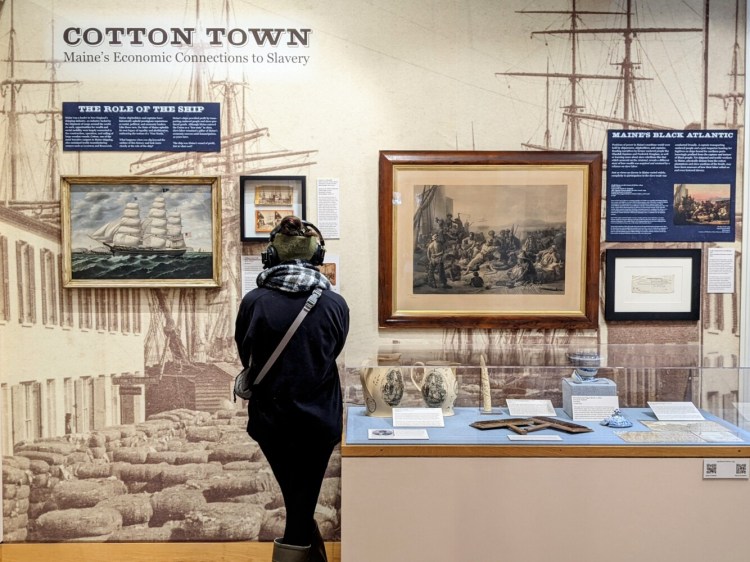Anybody who has driven along Valley and St. John streets in Portland has passed some significant historic sites, likely without ever knowing.
The neighborhood was home to several inns and restaurants considered safe and friendly to Black people visiting Maine. That fact was advertised in the “Green Book,” a travel guide designed for African Americans and published from the 1930s to the 1960s.
Finding such little-known historic facts is not easy. But with February being National Black History Month, there are opportunities across Maine. Museums, libraries and other cultural organizations are offering exhibits, films, talks and online resources that help illuminate the past and present of Black people in Maine.
Here, then, are some of the events and information related to National Black History Month being offered in Maine.
MAINE AND THE SLAVE TRADE
The Maine Maritime Museum in Bath is hosting “Cotton Town: Maine’s Economic Connections to Slavery,” an exhibition in collaboration with Bowdoin College’s Africana Studies department. It features artifacts and information related to Bath captains, merchants and shipbuilders who profited from slavery and wanted to see the practice continue. The exhibit includes pre-Civil War letters from captains and merchant log books that provide details about the transport of enslaved people on Maine ships. The exhibit is on view through May. Masks are required to enter the museum. Admission is $18 for adults and free for those under 18. For more information, go to Mainemaritimemuseum.org.

Lawrence T. Brown, founder of the racial equity and consulting firm Black Butterfly Academy, will give a virtual lecture Feb. 10 that will be available through the website of the Osher Map Library in Portland. Photo courtesy of Dr. Lawrence T. Brown
THE MAP TO DEMOCRACY
The Osher Map Library in Portland is offering access to a virtual lecture from equity scientist Lawrence T. Brown on Thursday, Feb. 10. Brown, founder and director of racial equity education and consulting firm the Black Butterfly Academy, will give a talk titled “Building the Abolition Democracy with GIS, Maps, Data and Archival Materials.” He is also the author of “The Black Butterfly: The Harmful Politics of Race and Space in America.” Brown will deliver the annual Mattson-New York Times Lecture, which will be available through the map library’s website. For more information about the free lecture and to register, go to Oshermaps.org.
A COMMUNITY UNEARTHED
The southern Maine town of Kennebunk was home to a community of formerly enslaved people from about 1785 to 1830. Some artifacts from that community – recovered during an archeological project – are now part of an exhibit at the Brick Store Museum in Kennebunk called “Who Makes History? How People, Museums and Archeology Can Tell the Full Story.” Furniture, tools, picture frames, cookware, bowls, writings and town records of the time are also on display. The exhibit also features artifacts and information related to the history of indigenous people in the area. Admission to the museum during February is free. For more information, go to Brickstoremuseum.org

The University of Maine Business School is presenting a free virtual screening of the documentary “Trace the Line” on Feb. 16 for Black History Month. Photo courtesy of Alejandro Miranda Cruz
DOCUMENTARY IN BLACK AND WHITE
The University of Maine Business School is marking Black History Month with a free virtual screening of the documentary film “Trace the Line” on Wednesday, Feb. 16. The film follows two artists in Madison, Wisconsin – one who is Black and one who is white – as they work and live during the pandemic and social unrest of the year 2020. According to the film’s website, “Asa, an African American poet, wrestles with the purpose of his life as a young Black man in a divided nation. Eva, a White painter, is confronted with her privilege in a society she no longer understands.” After the virtual screening, there will be a Q&A with the filmmakers. For a link to the screening, go to Umaine.edu and search for “Trace the Line.”

“The Negro Travelers’ Green Book” included restaurants and lodging establishments in Portland that were friendly to African Americans. Photo courtesy of Greater Portland Landmarks
TOURING HISTORY
You can take a walking tour of the St. John and Valley Street neighborhood in Portland by using the map and information on the Greater Portland Landmarks website. The area had a significant population of Black people in the late 1800s and early 1900s, many of whom worked at Union Station or on the Maine Central Railroad. The map also lists the Thomas Tourist Home on 28 A St., one of the places recommended to Black travelers in “The Green Book.” The Munjoy Hill neighborhood also had a vibrant African American neighborhood, and the website has information for a self-guided walking tour of that area as well, with a list of sites. For information on the self-guided tours to both neighborhoods, go to Portlandlandmarks.org.
HISTORY ONLINE
The Maine Historical Society has several online resources on the history of Black people in Maine. One is a panel discussion recorded in 2021 “It’s A Family Affair: A Personal Conversation about Black History in Maine.” Panel members shared their families’ history and experience in Maine dating back to the 18th century. Another panel discussion recorded last year and available on demand is titled “Nineteenth-Century Black Politics in Maine: Historical Research and Legacies.” To see other videos and resources, go to Mainehistory.org and search for “Black History.”
The Portland Public Library’s website has a list of books on Black History aimed at teen readers. The University of Maine’s Fogler Library has a Black History Month resources guide on its website, listing books, videos and articles it has on the subject.
Send questions/comments to the editors.



